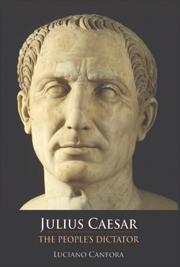Book contents
- Frontmatter
- Contents
- Translators' Note
- Acknowledgements
- Foreword
- PART I FROM SULLA TO CATILINE
- PART II FROM THE TRIUMVIRATE TO THE CONQUEST OF GAUL
- PART III THE LONG CIVIL WAR
- 16 Towards the Crisis
- 17 Striving after Tyranny?
- 18 Attacking the World with Five Cohorts
- 19 Caesar's ‘Programme’: In Search of Consensus
- 20 ‘Amicitia’
- 21 From the Rubicon to Pharsalus
- 22 Against Subversion
- 23 Alexandria
- 24 Caesar Saved by the Jews
- 25 From Syria to Zela
- 26 The Long Civil War
- 27 The Shoot of a Palm Tree: The Young Octavius Emerges
- 28 ‘Anticato’
- PART IV FROM THE CONSPIRACY TO THE TRIUMPH OF CAESARISM
- Chronology
- Bibliography
- Index
20 - ‘Amicitia’
from PART III - THE LONG CIVIL WAR
Published online by Cambridge University Press: 05 August 2013
- Frontmatter
- Contents
- Translators' Note
- Acknowledgements
- Foreword
- PART I FROM SULLA TO CATILINE
- PART II FROM THE TRIUMVIRATE TO THE CONQUEST OF GAUL
- PART III THE LONG CIVIL WAR
- 16 Towards the Crisis
- 17 Striving after Tyranny?
- 18 Attacking the World with Five Cohorts
- 19 Caesar's ‘Programme’: In Search of Consensus
- 20 ‘Amicitia’
- 21 From the Rubicon to Pharsalus
- 22 Against Subversion
- 23 Alexandria
- 24 Caesar Saved by the Jews
- 25 From Syria to Zela
- 26 The Long Civil War
- 27 The Shoot of a Palm Tree: The Young Octavius Emerges
- 28 ‘Anticato’
- PART IV FROM THE CONSPIRACY TO THE TRIUMPH OF CAESARISM
- Chronology
- Bibliography
- Index
Summary
The functioning of Roman public life depended on amicitia. The fulcrum of the political groups, amicitia also humanised and strengthened relations between representatives of different alignments. According to some, it explains Roman politics: it was certainly a determining factor also because the political class had a single provenance. Indeed, ‘the conservative Roman voter could seldom be induced to elect a man whose name had not been known for centuries as a part of the history of the Republic’. Cicero reflects on amicitia in a famous treatise, in which he asserts categorically (rather in contrast with his experience of life) that true amicitia must be disinterested. He fails to acknowledge that amicitia founded on mutual interest and benefit may be in every sense perceived as amicitia and to all intents the same. One should look therefore not to Cicero's De amicitia for an understanding of amicitia, but rather to Caesar's Commentaries on the civil war. Years later, Asinius Pollio would write that the ‘amicitiae principum’ were inextricably intertwined with the causes of the civil war.
There exist two letters, both addressed to Cicero, written after the death of Caesar, in which his correspondents, Asinius Pollio and Gaius Matius, who had followed Caesar in the civil war, explain with some embarrassment why they did so. In both cases the choice of side was determined by amicitia. Matius writes in August 44 bc: ‘It was not Caesar I followed in the civil conflict, but a friend.
- Type
- Chapter
- Information
- Julius CaesarThe People's Dictator, pp. 159 - 164Publisher: Edinburgh University PressPrint publication year: 2007

